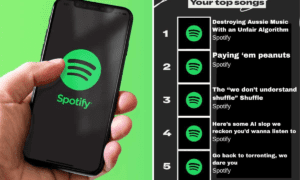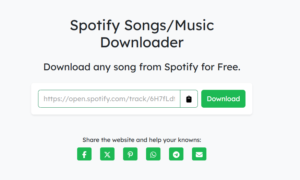In recent years, AI has been applied to various domains, including music, where it can create new songs, sounds, and genres based on existing musical data.
One of the most controversial topics is whether AI can produce music without imitating existing artists. In September 2023, Spotify CEO Daniel Ek addressed this issue in an interview with BBC News, where he said that he had no plans to completely ban content created by artificial intelligence from the music streaming platform.
He acknowledged the ongoing debate surrounding AI in music creation and outlined the platform’s stance on the matter.
He said that using AI in music was likely to be debated for “many, many years”.
Ek’s comments came after Spotify removed a viral AI-generated song that mimicked the voices of Drake and The Weeknd in April 2023. The song, called “Heart on My Sleeve”, was posted by an unidentified TikToker and streamed millions of times before being removed by Spotify and other streaming platforms.
Neither Drake nor The Weeknd were aware of cloned versions of their voices being used on the song. The creator of the song later tried to have it nominated for a Grammy award but it was turned down.
Spotify is not the only platform that has faced challenges with AI-generated music. In 2018, YouTube took down several videos that used an AI model called WaveNet to synthesize realistic-sounding speech and singing.
The videos included covers of songs by Adele, Frank Sinatra, and Elvis Presley, among others. YouTube claimed that the videos violated its terms of service, which prohibit impersonating another person or misleading users about the source of content.
While some see these cases as examples of how AI can infringe on the rights and identities of artists, others see them as opportunities for experimentation and innovation.
But how does AI affect the music industry and the artists who create music? Is AI a tool for musical innovation or a threat to human creativity?
Spotify’s Stance
Spotify has taken a nuanced stance on AI-generated content. While the company has removed AI-generated songs that impersonate real artists, it has also introduced its own AI-enabled features. Spotify CEO Daniel Ek acknowledges that AI in the music industry is a topic that will be debated for years.
Ek outlined three “buckets” of AI use in an interview with the BBC:
- AI-generated content that impersonates someone without their consent: Spotify removes songs that fall into this category.
- AI-generated content that is inspired by an artist without claiming to be them: Songs in this middle ground, which are either inspired by artists or entirely AI-generated, can remain on the platform.
- AI-enabled features that enhance user experience: Spotify has introduced AI-powered features such as translating podcasts recorded in English into other languages while preserving the original speaker’s voice.
Spotify’s approach reflects a balance between removing unauthorized AI-generated content and embracing the potential of AI to enhance creativity and user experience. The company’s decisions are guided by considerations of consent and artistic integrity.
Spotify’s use of AI encompasses both aspects. While some AI-generated content may imitate artists, Spotify also employs AI to develop innovative features and improve user experience. The company’s approach strikes a balance between these two objectives, aiming to protect artists’ rights while leveraging AI’s potential for musical innovation
The Good, Bad and Grey Area
AI has become an invaluable tool in the music industry, offering a range of possibilities for enhancing music creation and listening experiences. One prominent example is auto-tuning, a technique that uses AI algorithms to correct pitch inaccuracies in vocal recordings.
Auto-tuning has revolutionized the music industry by enabling artists to achieve precise pitch control and create polished, professional-sounding tracks. This technology has been widely adopted by artists across various genres, enhancing their vocal performances and contributing to the overall quality of their music.
The benefits of AI in music extend beyond auto-tuning. For artists, AI can streamline the creative process by providing access to vast libraries of sounds, samples, and musical ideas.
AI-powered tools can generate musical suggestions based on an artist’s input, helping them explore new directions and overcome creative blocks. Additionally, AI can assist in music production tasks such as mixing and mastering, saving time and resources for artists.
Listeners also benefit from AI-driven innovations. Music streaming platforms like Spotify leverage AI algorithms to curate personalized playlists and recommendations based on users’ listening habits.
These algorithms analyze vast amounts of data, including user preferences, listening history, and contextual information, to deliver tailored music recommendations. This enhances the listening experience by introducing users to new artists, genres, and songs that align with their tastes.
The rise of AI-generated content has raised ethical concerns within the music industry. The ability of AI to mimic human artists blurs the line between originality and imitation. Some artists argue that AI-generated music lacks the emotional depth and authenticity that comes from human creativity. They express concerns about the potential devaluation of human artistry and the impact on artistic integrity.
Spotify’s Limitations on AI
Spotify has been exploring the potential of AI in various aspects of its platform, but it also has certain limitations on using AI for content generation and training. While Spotify does not ban AI-generated music, it has removed songs that impersonate real artists without their consent. This approach aims to protect artists’ rights and maintain the integrity of their work.
The implications of these limitations are twofold. For artists, it ensures that their original content is not misrepresented or misused by unauthorized AI-generated songs. This helps safeguard their creative expression and maintain control over their artistic identity. On the other hand, AI developers may face challenges in training AI models using Spotify’s content due to restrictions on unauthorized impersonation.



































